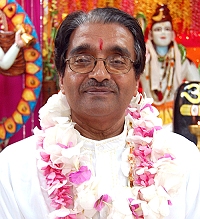From an interview with Paramacharya of SWAHA, H.H. Pt. Hardeo Persad
Pitra Paksh is that time of the year when we observe the fortnight dedicated to our ancestors. Pitra means ‘ancestor’, Paksha means ‘fortnight’. Thus, at this time of the year, we observe the fortnight dedicated to the ancestors, Pitra Paksha. During this period, we need to reflect upon their contributions to our lives. The Shiva Samhita states that there are five debts (panch rin) of gratitude that we have as human beings: Deva rin: gratitude to God; Pitri rin: gratitude to one’s ancestors; Rishi rin: gratitude to the sages; Manush rin: gratitude to humanity; and Bhoot rin: gratitude to nature and the lower forms of creation. We express gratitude to them on a daily basis through the five yagyas that we perform: We must worship God on a daily basis. We read religious scriptures and practise the religious activities to acknowledge our debt to the sages. The ancestors have provided us with a body of laws, practices and values that we must practise, guard and enhance where possible so that we may pass it on to the next generation. We all owe a debt to society. It is said that life is like a flower in full bloom and we should give the flowers to that Gardener who brought life into existence. In this way, service to humanity is service to God. We must also, as humans, express our gratitude to the lower forms of creation.
During Pitra Paksha, we pay homage to the pitris (ancestors). The sages have created a wonderful process through which we can free ourselves from our debt of gratitude. At this time, we emphasize the sacrifices of the ancestors, their contribution to human development and their role in who we are today.
Among the various rituals that we perform during this time, is an offering of food to the departed. We make that offering while praying that some merit will reach the ancestors, wherever they may be. No one knows where they are at that point in time. At death, the body dies but the soul does not. It is unborn and eternal. It does not require food to survive. However, this creation is made up of energy and we can transmit that energy to them. We cannot liberate the soul through our actions; he or she has to create their own karmas (actions and their consequences). In fact, the religious activities that we perform in Pitra Paksha mainly redound to our own benefit. These practices have been given to us by the sages and we must remember that merits will be attained by those who follow the path of our ancestors, including the rituals of Pitra Paksha.



